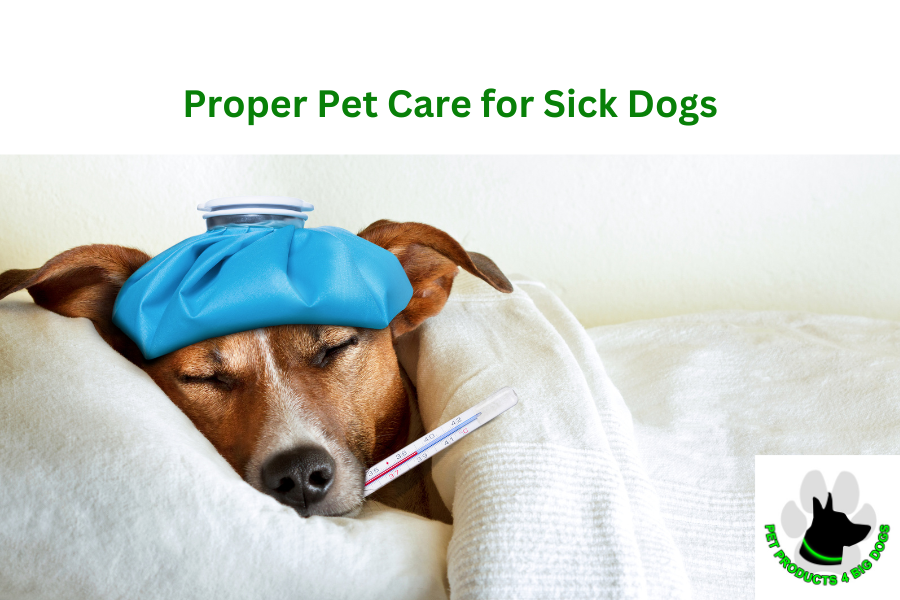It’s awful when our four-legged friends get sick. It might be just something that has upset their stomach, or recovery from a surgery, getting de-sexed, more serious illness, or quite simply the ailments that occur with getting older. I’m not a vet, but there are definitely some things you can do to ensure your dog is as comfortable and safe as possible.
Pet Care for Sick Dogs
Start with ensuring they have a safe and cozy shelter.
Remember after surgery, they often cannot regulate their body heat for a period of time, so especially be careful they don’t over heat or get cold. Whether your dog is indoors or outdoors, they usually enjoy having a comfortable bed. If they are an older dog, or have issues with hips etc, then an orthopedic bed is ideal. Remember that older dogs can sleep for as much as 18-22 hours a day (yep, that long), so they need something that provides both support and comfort.
Naturally, don’t forget to ensure they’ve got plenty of fresh water.
Unless of course your vet has said to not have that, although this is usually leading up to surgery, not afterwards. But point is, follow the directions of your vet and if they say something you don’t understand, then clarify before you leave. Better to be sure, than to wonder what to do.
Just like us, our big dogs need health food (all pets do).
Remember also the right amount of food; pups and working dogs need more than say an older for sedimentary dog. Like us, the more weight they carry, the more if affects their health. If you’re unsure, ask your vet whether s/he thinks your pet is right for their breed and age. Personally, I’ve found with my dogs, the day or so after surgery, they are just not interested in food, so I’d start with offering them a little cooked chicken breast (yes, I know I’m spoiling them) but handfeeding a few pieces to get their appetite back, and stimulate hunger certainly worked for us.
Pets need to regularly go to the bathroom.
You should clean your pet’s bathroom wherever it may be. With good hygiene and sanitation, it will prevent dirt and bacteria from causing further problems. You may have to assist them, depending on the situation, so again, talk to your vet in respect of your particular case. Especially after surgery, take note of times/amounts/consistency when they urinate and poop. I know that sounds gross, but they are the sort of things your vet will need to know if there are issues, so be observant and mentally (or actually) make note of these details.
Dogs with muscle problems or arthritis, may benefit from a massage.
I know a wonderful therapist in the Redlands (Brisbane Southside) but ask your vet. They might even be able to teach you how to do it yourself … as a good massage can help get your dog going in the morning.
Giving medicines to dogs can be hard work.
Especially for a large dog, those tablets can sometimes look like something a horse would swallow, they are just so huge. Every dog is different; some you can just put it down their throat, hold their mouth closed and gently massage under the chin. Another strategy is grinding it into their food. I don’t really like that method, because food can be left and remember they have an excellent sense of smell, you won’t fool them. My favourite (especially for a short term situation) is to cook a sauage, (or get one from the fridge or micro and heat it up a tad). Cut a piece, hallow out a spot, put the tablet. Firstly, give one un-tarnished one to him first. They aren’t stupid, so the first one, they will be wary. All good, then give the ‘spiked’ piece of sausage. Then finish off with another piece which doesn’t have a tablet, just to get rid of any flavour – and keep him guessing. That way, if he’s worked out the tablet is in there, he'll spit it out and you’ll know. Depending on the tablet size, and sensibility of your dog, you might even have to split the tablet between 2 pieces of sausage. Soft cheese (Mersey Valley) works well as it’s deliciously pungent, but you don’t want to be giving your dog too much cheese either. It’s finding that balance. Some dogs like peanut butter, which might be another option. Warning though, check the medication label that it's ok to be given with food. Also be sure to keep medicine up high, away from pets or children!
If a dog or puppy is being sick (vomiting) or has diarrhea, you can skip a meal (but ensure water is provided).
Offer a small amount of white meat (boiled chicken or boiled fish like Cod with white rice). This is often a good tummy settler. The trick is to ensure it’s a small amount – wait 2 hours before giving more. If symptoms continue (or there is anything else, like bleeding from the anus) then absolutely see your vet. If all is going well, then ‘wean’ them from the bland diet back to their own gradually. Keep things bland and trial different things. Some dogs are sensitive to some things, but would not affect the next dog.
Dogs with sore skin, injuries, post surgery, just love to lick.
Whilst we (and them) don’t love those e-collars, they are critical. Licking wounds and sores will only make them worse and have you back at the vet time and time again for treatment. If you can put socks on their feet, great, but I’ve not had success with that. The e-collar is really most effective. I have tried putting an old t-shirt on Caesar, which worked ok during the day whilst I could watch him, but not something to leave them with – they just seem to find a way around it. For simple things, don’t forget good old ‘warm water with little salt’ as a home made solution for bathing a simple wound.
Naturally, anything which bothers you – go see your vet.
Far better to get a blood test or have them checked over, than to lose sleep worrying, or worse, let something serious get worse. Trust your instincts, and if your best friend just isn’t themselves, then investigate. The first thing may be hunting for ticks, but sometimes problems occur, especially with other dogs, which are internal and will need to be professionally diagnosed and treated.
If you’ve a sick doggy at home, I wish you every good wish for their speedy recovery so that you can share many more months, or hopefully years together. 🐾 🐾
Read How to Puppy Proof Your Home.

